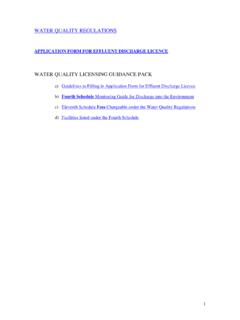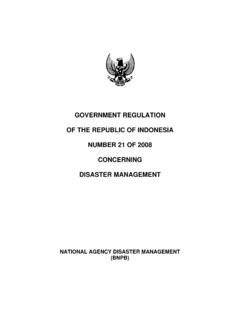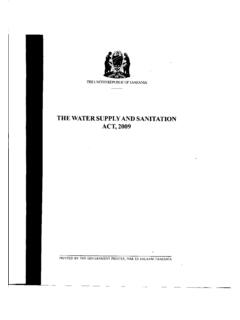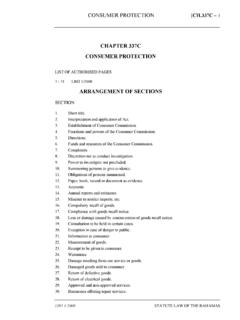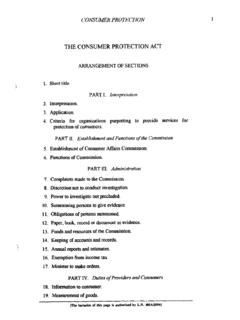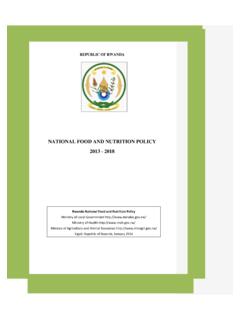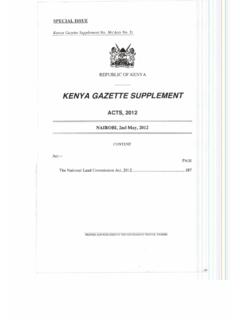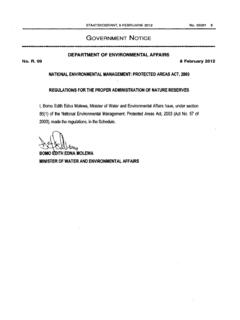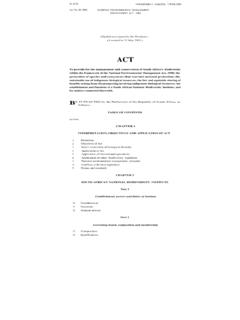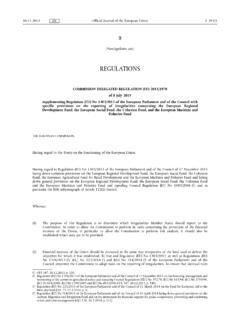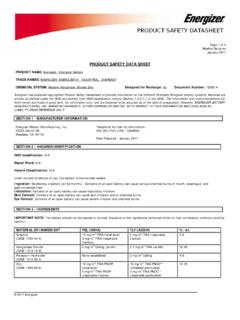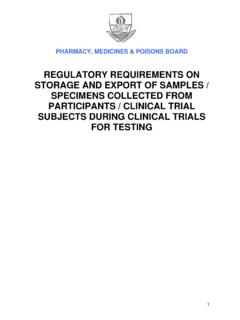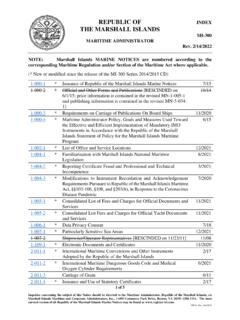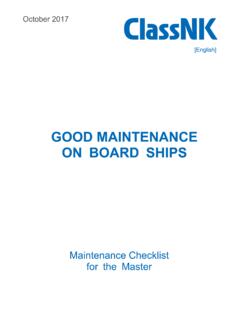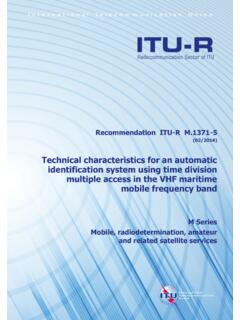Transcription of Maritime (Carriage of Dangerous Goods) Regulations 2014
1 406 [LEGAL NOTICE No. X9j Maritime TRANSPORT DECREE 2013 (DECREE No. 20 OF 20U) Maritime ( carriage of Dangerous Goods) Regulations 2014 TABLE OF PROVISIONS PART I-PRELIMINARY I. Short title and commencement 2. Interpretation 3. Purpose 4. Application PART 2-RESPONSIBILITIES 5. Master 6. Dangerous goods list or manifest 7. Shipper 8. Owner 9, Authorised officers 10. Consolidators and packers 11. rvIanufacturers of intermediate bulk containers and packaging 12. All persons PART 3 -SHIPS 13. Explosives in passenger ships 14.]
2 Ships carrying Dangerous liquid chemicals in bulk -requirements for new chemical carriers 15. Requirements for existing chemical carriers 16. Ships carrying liquefied gases in bulk ~ requirements for new gas carriers 17. Requirements for existing gas carriers PART 4-REPORT AND HANDLING OF Dangerous GOODS INCIDENTS 18. Dangerous goods that have been offered to a ship in a Fiji port or at a Fiji offshore terminal 19. Dangerous goods incidents 011 a ship in a Fiji port or at a Fiji offshore terminal 20. Dangerous goods incidents at sea 21, Obligation to have incident plans SCHEDULE I SCHEDULE 2 467 Maritime TRANSPORT DECREE 2013 (DECREE No.)
3 20 OF 2013) Maritime ( carriage OF Dangerous GOODS) Regulations 2014 IN exercise of the powers conferred upon me by section 240( I )( m) of the Maritime Transport Decree 2013, I hereby make these Regulations -PART 1-PRELIMINARY Short rirIe and ("()/lllI/t'lIn'/JIen! I. These Regulations may be ciled as the Maritime ( carriage of Dangerous Goods) Regulations 2014 and shall come into force on a date appointed by the Minister by notice in the Inte/prell/lio/l 2. In these Regulations , unless the context otherwise requircs-"Authority" means the Maritime Safety Authority of Fiji; "authorised officer" means any person or persons authorised for any purpose under the Decree by the Chief Executive Officer.
4 "Bulk Chemical Code" or "BCH Code" means the Code for the Construction and Equipment of Ships Carrying Dangerolls Chemicals in Bulk adopted by the International Maritime Organization by Assembly Resolution (VII), as amended by Resolutions (l2), MSC 9(53), MSC 15(57), MSC 18(58), MSC 29(61), MSC 51(66), !vISC 106(73); "cargo" includes mail and passengers' baggage; "Chief Executive Officer" means the Chief Executive Officer of the Maritime Safety Authority of Fiji; "chemical tanker" means a non-passenger ship constructed or adapted and used for the carriage in bulk of any liquid product listed in Chapter 17 of the International Bulk Chemical Code; "Consolidator" means a person who packs or supervises the packing of cargo for variolls shippers into a container or vehicle for transport by sea.
5 "consignment" means any package or packages, or load of Dangerous goods, presented by a person, organisation or government for transport; "container" or "freight container" means an article of transport equipment that is-(a) of permanent character and accordingly strong enough to be suitable for repeated use; and (b) specially designed to facilitate the transport of goods, by onc; or (c) designed to be secured or readily handled or both, having fittings for these purposes, and shall not include a vehicle or packaging but shall include a container that is carried on a chassis; 468 "constructed" in respect of a ship means a stage of construction where~ (a) the keel of the ship is laid; (b) constmction identifiable with the specific ship has begun.
6 Or (c) assembly of that ship has commenced comprising at least 50 tonnes or 1 % of the estimated mass of all structural material, whichever is less; " Dangerous goods" means-(a) any substance, in packaged form or in solid form in bulk, listed and classified according to its hazards in the IMDG Code; (b) any harmful substance; and (e) empty receptacles that have been used for substances specified in paragraph (a), unless the receptacles have been cleaned, subsequently dried, and, where appropriate, gas freed but does not include goods forming part of the equipment or stores of the ship in which they are carried; " Dangerous goods transport document" means a certificate for a consignment of Dangerous goods containing the information required by Volume I, Section 5,4 of the IMDG Code.
7 " Dangerous goods list or manifest" means-(a) a special list or manifest setting out the Dangerous goods on board and their location on board; or (b) a detailed stowage plan that identifies by class, and sets out the location of, all Dangerous goods on board; "Decree" means the Maritime Transport Decree 2013; "Gas carrier" means a non-passenger ship constructed or adapted and used for the carriage in bulk of any liquefied gas or other product listed in chapter 19 of the I GC Code; "Gas Carrier Code" means the Code for the Construction and Equipment of Ships Carrying Liquefied Gases in Bulk adopted by the International Maritime Organization Resolution (48), as amended by Resolution MSC 17(58), MSC 30(61), MSC 59(67), MSC 103(73), and MSC 220 (82) from time to time; "Jetty Master" means any person appointed as a Jetty Master under section 101 of the Maritime Transport Decree 2013.
8 "harmful substance" means-(a) any substance in packaged form for the time being identified as a marine pollutant in the IMDG Code; and 469 (b) any empty packaging that has been used previously for the caniage of a substance specified in paragraph (a), unless adequate precautions have been taken to ensure that the packaging contains no residue that is harmful to the marine environment but does not include a ship's stores and equipment; "in bulk" means carried in the cargo or other spaces of a ship without any intermediate form of containment Of packaging; "Intermediate Bulk Container" or "IBe" means any rigid, semi-rigid or flexible portable packaging, other than those specified in Volume I, Parts 4 and 6 of the IMDG Code, that-(a) has a capacity of-(i) not more than cubie metres (3000 litres) for solids and liquids of packaging group II and III.
9 (ii) not more than cubie metres for solids of packaging group I when packed in flexible, rigid plastics, composite. fibreboard or wooden IBes; or (iii) not more than cubic metres for solids of packaging group I when packed in metal !BCs; (b) is designed for mechanical handling; and (e) is resistant to the stresses produced in handling and transport, as determined by the applicable tests specified in Volume I, Part 6 of the IMDG Code but does not include any portable tank; "International Bulk Chemical Code" or "!
10 BC Code" means the International Code for the Constmction and Equipment of Ships Carrying Dangerous Chemicals in Bulk adopted by the Marine Environmental Protection Committee of the International Maritime Organization by Resolution (22), as amended by Resolution MEPC. 90(45) in 2000; "International Gas Carrier Code" orHIGC Code" means the International Code for the Constmction and Equipment of Ships Carrying Liquefied Gases in Bulk adopted by the Maritime Safety Committee of the International Maritime Organization by Resolution (48) as amended by Resolution MSC 17(58),MSC 30(61),MSC 59(67),MSC 103(73),MSC 220(82), from time to time; "International Maritime Dangerous Goods Code" or "IMDO Codel!
